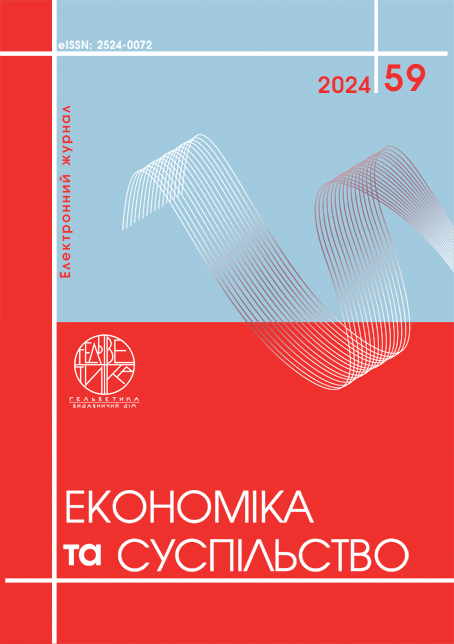THE EUROPEAN APPROACH TO COMBATING CRIMINAL BEHAVIOR BY PROBATION AUTHORITIES
Abstract
The subject of the study is the institution of probation as an integral part of the criminal justice system of European countries. The introduction of the probation service in Ukraine is not only a step towards European standards of compliance with human rights, but also a significant prospect of "correcting" offenders without imprisonment. The purpose of the article is to study the European experience of overcoming criminal behavior by probation authorities. The article used research methodology: comparison, generalization, scientific abstraction, system analysis. The practical value of the study lies in the comparison of the experience of European countries regarding criminal legal measures not related to the isolation of offenders from society. The birth of the American model of the probation service is associated with the name of John Augustes, who is often called "the first probation officer." Almost fifty years after the introduction of probation supervision in the United States, the United Nations and the Council of Europe began the process of signing international regulatory documents that expanded the list of measures that are alternatives to imprisonment. In Great Britain, the institution of probation is considered a punitive and legal measure. Practical implications. In Estonia, it is considered as an exemption from serving a sentence. Instead, in countries such as Latvia and Sweden, this institution is integrated into the penal system. In Norway, the probation service is an integral segment of the penitentiary system, aimed primarily at ensuring public safety. Given the age of the offender (a minor), social workers (teachers, psychologists, etc.) play a key role in any probation system, and not lawyers or prison staff. The experience of Spain is positive, where, as one of the probationary measures, a person is required to participate in educational, educational, cultural programs, as well as undergo a rehabilitation program or therapeutic treatment. Also, in this country, a number of technical means are used to ensure the functioning of electronic monitoring, namely: GPS, biometric voice control, control of the presence/absence of a person using radio transmitters. The main purpose of Swedish probation is to help the offender understand where he broke the law, correct the situation and return the potential taxpayer back into society. Results. Restorative justice programs are an effective component of probation services: they have an educational impact on the offender, prevention of repeated offenses, and promotion of social adaptation and reintegration of offenders into society. Value/originality. European experience shows that the introduction of the probation service is an important factor that has a positive impact on society.
References
Пробація замість в’язниці: міжнародний досвід – на користь українців. URL: https://www.probation.gov.ua/?p=9051 (дата звернення: 10.02.2024).
Самороков В.О. Кримінально-правові аспекти інститутів обмеження волі та пробації: відповідність провідним європейським правозастосовним стандартам. Електронне наукове видання «Аналітично-порівняльне правознавство». 2023. С. 342¬346.
Сімакова С.І. Пробація, як механізм міжнародного досвіду роботи із правопорушником. Юридичний науковий електронний журнал. 2019. № 3. С. 235-237.
Сметаніна Н. В. Досвід застосування пробації у країнах європейського союзу. Право і суспільство. 2019. № 2. С. 183¬187.
Гусак А. П. Зарубіжних досвід пробації та протидії злочинності засобами пробації. Прикарпатський юридичний вісник. 2023. Вип. 2 (49). С. 93¬98.
Probatsiia zamist viaznytsi: mizhnarodnyi dosvid – na koryst ukraintsiv [Probation instead of prison: international experience – in favor of Ukrainians]. Available at: https://www.probation.gov.ua/?p=9051 (accessed February 10, 2024);
Samorokov V.O. (2023) Kryminalno-pravovi aspekty instytutiv obmezhennia voli ta probatsii: vidpovidnist providnym yevropeiskym pravozastosovnym standartam [Criminal law aspects of institutions of restraint of will and probation: compliance with leading European law enforcement standards]. Elektronne naukove vydannia «Analitychno-porivnialne pravoznavstvo», pp. 342¬346.
Simakova S.I. (2019) Probatsiia, yak mekhanizm mizhnarodnoho dosvidu roboty iz pravoporushnykom [Probation as a mechanism of international experience in working with an offender]. Yurydychnyi naukovyi elektronnyi zhurnal, pp. 235-237;
Smetanina N.V. (2019) Dosvid zastosuvannia probatsii u krainakh yevropeiskoho soiuzu [Experience of using probation in the countries of the European Union]. Pravo i suspilstvo, рр. 183¬187;
Husak A.P. (2023) Zarubizhnykh dosvid probatsii ta protydii zlochynnosti zasobamy probatsii [Foreign experience of probation and combating crime by means of probation]. Prykarpatskyi yurydychnyi visnyk, рр. 93¬98.

This work is licensed under a Creative Commons Attribution 4.0 International License.


